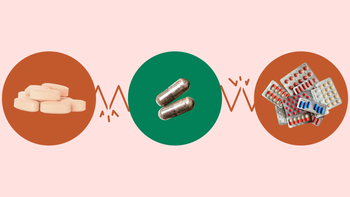
How to Choose the Best Glutathione Supplement
Key takeaways:
Glutathione is a powerful antioxidant that’s important for health. Most people make enough glutathione and don’t need to take supplements.
Liposomal or sublingual glutathione supplements are more likely to raise glutathione levels in the body.
Talk with your healthcare team before starting glutathione supplements. Your team can help you choose the supplement that best fits your needs.
Table of contents

Glutathione supplements are a dietary supplement that get a lot of attention. Glutathione is a powerful antioxidant that helps support health in many ways. Most people make enough glutathione and don’t need to take extra supplements. But people with certain medical conditions develop low glutathione levels and really can benefit from glutathione supplements.
It’s important to note that there are many dietary supplements available. While most claim to have various health benefits, the research isn’t always so clear-cut. It can be hard to figure out which supplements are really worth it. Plus, supplements aren’t always safe for everyone.
So, here we break down what research says about glutathione supplements, who can really benefit from these supplements, and how to choose the best glutathione supplements for your health needs.
Search and compare options
What is glutathione?
Glutathione is an antioxidant made of three amino acids: glutamate, cysteine, and glycine. These building blocks matter when you’re choosing a supplement (more on that later).
The liver makes glutathione and releases it into the blood stream. Glutathione goes on to support many important body functions. Glutathione:
Breaks down free radicals, which are substances that can damage the body
Maintains cells’ redox balance, which is necessary for cells to function
Helps break down harmful substances in the body
Helps regulate the immune system
Simply put, your cells rely on glutathione to stay healthy and do their job. And since cells are the basic unit of life, keeping them healthy is critical for your overall health.
What are the benefits of glutathione supplements?
Without glutathione, your cells wouldn’t be able to function. Most people make enough glutathione to keep their cells healthy. They don’t have to take supplements or change their diets to keep their glutathione levels in a healthy range.
But some health conditions can reduce glutathione levels or keep people from making enough glutathione. In these cases, glutathione supplements can help people keep their glutathione levels in a healthy range.
Milk thistle and glutathione: Milk thistle can help boost glutathione levels naturally. Three people share with GoodRx what it’s like to take milk thistle.
Some medications also increase glutathione levels. Our pharmacy experts explain how N-acetylcysteine (NAC) boosts glutathione and when to use it.
Looking for other ways to lower inflammation? Avoid these foods that are linked to inflammation.
For example, research shows that glutathione supplements are helpful for:
People who have cystic fibrosis
Older people who have HIV
Certain people with Parkinson’s disease
People receiving certain types of chemotherapy
But the reported benefits of glutathione supplements go beyond these situations. Some research claims that glutathione can help:
Lessen liver damage associated with metabolic dysfunction-associated steatotic liver disease (MASLD), formerly known as nonalcoholic fatty liver disease
Manage or even lower the risk of Type 2 diabetes
Even skin tone in people with pregnancy-related melasma
Muscle recovery following intense exercise
Read more like this
Explore these related articles, suggested for readers like you.
More research is needed to know if glutathione supplements can help everyone with these conditions. It’s also unclear how much glutathione people need to take to get these benefits. It’s also not clear how long people need to take supplements in order to get these health benefits.
What are the best glutathione supplements?
Glutathione supplements come in different forms, including:
Tablets or capsules
Liquid
Intranasal sprays
Dissolvable sublingual tablets
Creams and sprays
Nebulized medications
Intravenous infusions
Many of these forms are only available by prescription. Others, like tablets and capsules, are available in retail pharmacies, supermarkets and specialty stores.
The best glutathione supplement depends on your overall health and the reason you’re taking glutathione supplements. Here’s some information to keep in mind.
Liposomal glutathione
It’s not clear how well some oral glutathione supplements — like tablets or capsules — work to increase overall glutathione levels in the body. Some research suggests that one-time doses and longer-term supplement use doesn’t increase glutathione levels in the body. Experts believe this happens because gut enzymes break down oral glutathione supplements before they can reach the body’s cells.
So it’s possible that people who take oral glutathione supplements never have a chance to reap the benefits of the supplement.
To address this issue, you can try liposomal glutathione supplements. Liposomes are pockets of fat bubbles. Researchers believe that fat bubbles protect glutathione from stomach acids and other gut enzymes that may break it down before it reaches the body’s cells. One small study found that liposomal glutathione supplements raised glutathione levels in the body.
Sublingual tablets
Glutathione is also available as sublingual tablets. You place these tablets under your tongue and the supplement dissolves. The glutathione is absorbed by the blood vessels under your tongue and then goes to your cells.
One study showed that sublingual glutathione supplements were superior to regular glutathione tablets in raising the body’s levels of glutathione. Experts believe this happens because sublingual glutathione is able to bypass the gut and avoid breakdown by gut enzymes.
It’s not clear if sublingual glutathione is better than the liposomal glutathione at raising the body’s glutathione levels. There’s no research comparing the two.
N-acetylcysteine
You can also increase the body’s glutathione levels by taking supplements containing amino acids that make up glutathione. These amino acids are glutamate, cysteine, and glycine.
The most common amino acid form available is N-acetylcysteine (NAC), which contains cysteine.
The intravenous (IV) form of NAC is FDA approved to treat acetaminophen (Tylenol) poisoning. Nebulized (inhaled) NAC is used to treat certain lung conditions because it breaks up mucus. These forms are only available via prescription or in a healthcare setting.
But NAC is also available as an over-the-counter (OTC) supplement. Research shows supplements may help increase glutathione levels by providing your body with more of glutathione’s building block.
It’s not clear whether NAC works better than liposomal or sublingual glutathione to increase the body’s glutathione levels.
What should you look for in glutathione supplements?
It’s always best to talk with your healthcare team before starting any new supplements. Your team can make sure glutathione supplements are safe for you and that they don’t interfere with your medications. They may also be able to point you to the best glutathione supplements.
Things you should look for in a glutathione supplement include:
Formulation: Current research shows that liposomal and sublingual forms are the most effective at increasing glutathione levels. Experts need to do more work to determine the best glutathione supplement, but it’s probably best to try one of these forms.
USP-verified mark: Glutathione supplements are not regulated by the FDA. That means any product may not actually contain what’s reported on the label. Look for products with the United States Pharmacopeia (USP-verified) mark, which helps certify that products contain what’s listed on the label.
Trustworthy brand and supplier: Since glutathione supplements are not regulated by the FDA, they are not checked for safety or purity. Facilities producing supplements aren’t held to the same standards either. It’s a good idea to buy supplements from reliable suppliers and brands.
How much glutathione do you need?
It’s not clear how much glutathione people need to take to raise the glutathione levels in their body. It’s also not clear what a “goal” glutathione level should be for people who take glutathione to improve their general health.
There’s very little information on how much glutathione is safe to take. And it’s not clear when people should stop taking supplements.
One study found that taking 250 mg to 1,000 mg of oral glutathione each day helped increase levels in the body. This study also noted that people tolerated these dosages well. But that doesn’t mean that these dosages will work for everyone. And some people may experience side effects even at these dosages.
It’s best to discuss glutathione supplements with your healthcare team to decide which dosage is right for you. Your team can also help you decide when it’s time to stop taking supplements.
The bottom line
Glutathione is an important antioxidant that plays a role in many body functions. Most people make enough glutathione to support their health and don’t need to take supplements. If you choose to take a glutathione supplement, a liposomal or sublingual form is more likely to help raise your body’s glutathione levels.
Why trust our experts?


References
Allen, J., et al. (2011). Effects of oral glutathione supplementation on systemic oxidative stress biomarkers in human volunteers. Journal of Alternative and Complementary Medicine.
Aoi, W., et al. (2015). Glutathione supplementation suppresses muscle fatigue induced by prolonged exercise via improved aerobic metabolism. Journal of the International Society of Sports Nutrition.
Atkuri, K. R., et al. (2007). N-acetylcysteine — a safe antidote for cysteine/glutathione deficiency. Current Opinion in Pharmacology.
Cascinu, S., et al. (2002). Neuroprotective effect of reduced glutathione on oxaliplatin-based chemotherapy in advanced colorectal cancer: A randomized, double-blind, placebo-controlled trial. Journal of Clinical Oncology.
Ershad, M., et al. (2024). N-acetylcysteine. StatPearls.
Ghezzi, P. (2011). Role of glutathione in immunity and inflammation in the lung. Dovepress.
Handog, E. B., et al. (2016). An open-label, single-arm trial of the safety and efficacy of a novel preparation of glutathione as a skin-lightening agent in Filipino women. International Journal of Dermatology.
MedlinePlus. (n.d.). Antioxidants.
Michael J. Fox Foundation for Parkinson’s Research. (2015). Ask the MD: Glutathione and Parkinson’s.
Minich, D. M., et al. (2019). A review of dietary (phyto)nutrients for glutathione support. Nutrients.
Nguyen, D., et al. (2013). Effect of increasing glutathione with cysteine and glycine supplementation on mitochondrial fuel oxidation, insulin sensitivity, and body composition in older HIV-infected patients. Journal of Clinical Endocrinology and Metabolism.
Pham-Huy, L. A., et al. (2008). Free radicals, antioxidants in disease and health. International Journal of Biomedical Science.
Richie, J. P., Jr., et al. (2014). Randomized controlled trial of oral glutathione supplementation on body stores of glutathione. European Journal of Nutrition.
Schmitt, B., et al. (2015). Effects of N-acetylcysteine, oral glutathione (GSH) and a novel sublingual form of GSH on oxidative stress markers: A comparative crossover study. Redox Biology.
ScienceDirect. (n.d.). Glutathione.
Sinha, R., et al. (2019). Oral supplementation with liposomal glutathione elevates body stores of glutathione and markers of immune function. European Journal of Clinical Nutrition.
Tuell, D., et al. (2024). The role of glutathione and its precursors in Type 2 diabetes. Antioxidants.
United States Pharmocopeia. (n.d.). USP verified mark.
Witschi, A., et al. (1992). The systemic availability of oral glutathione. European Journal of Clinical Pharmacology.
Zhao, J., et al. (2019). Efficacy of glutathione for patients with cystic fibrosis: A meta-analysis of randomized-controlled studies. American Journal of Rhinology & Allergy.
Zuo, J., et al. (2020). Redox signaling at the crossroads of human health and disease. MedComm.





























